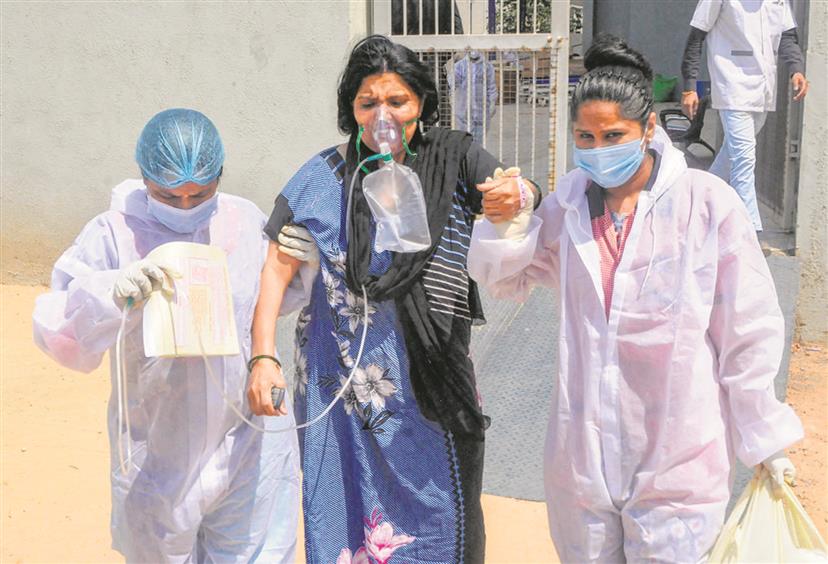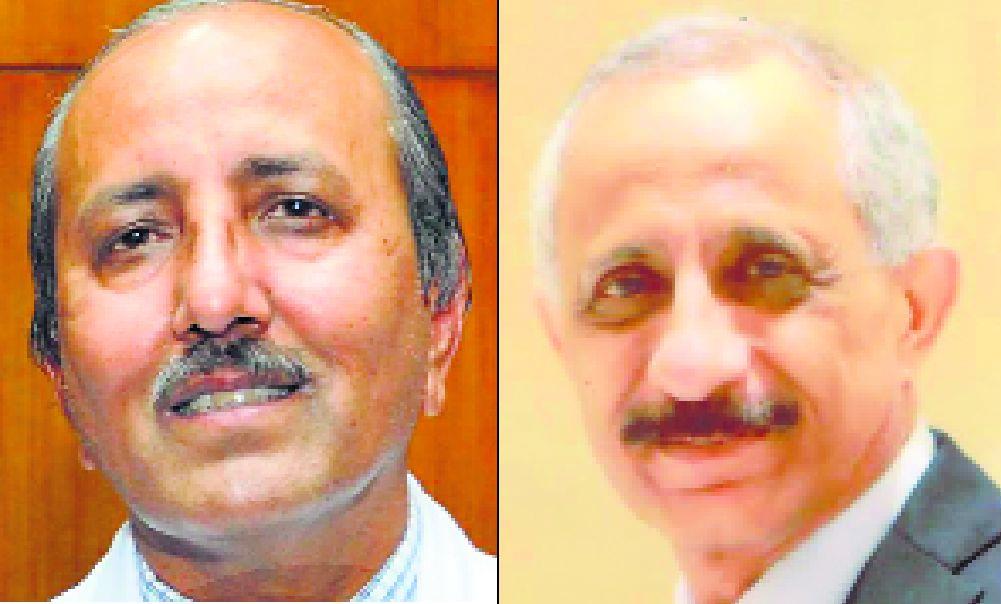
Ominous: The rate of increase in the number of daily cases in the second wave is much faster than in the first one. PTI
Jagat Ram and Rakesh Kochhar
Director, PGI and Prof, Gastro dept
India recorded over two lakh cases of Covid-19 on April 14, crossing the grim milestone for the first time since the beginning of the pandemic more than a year ago. The rate of increase in the number of daily cases is much faster than before, making the second wave more ominous. As Dr K Srinath Reddy, president of the Public Health Foundation of India, has said, “It’s a perfect storm of careless crowd behaviour, laxity in government vigilance and a misleading perception of herd immunity. The virus rode through gates which were left wide open.”
Many countries are witnessing an upsurge of cases, often surpassing the previous highs. They include Brazil, France, Germany, Italy and Poland. Several countries have reimposed lockdowns and travel restrictions.
While it had taken over 90 days for the caseload to increase from 15,000 a day to the peak of 97,000 a day in 2020, the second wave has seen cases jumping from one lakh per day to two lakh per day in just 10 days. Equally worrisome is the fact that the positivity rate (percentage of positive tests done) crossed 14 per cent in April this year.
Covid fatigue is one of the most important causes of the surge. As there was a decline in cases from November 2020 onwards, a sense of complacency had set in among the people who had stayed indoors since the outbreak began. Encouraged by the lower case fatality in India, relaxations in enforcing Covid-appropriate behaviour, and a belief that the worst was over, both the state and the people lowered their guard. This was, perhaps, also the reason why the initial response to vaccination among healthcare workers, which began on January 16, was lukewarm.
The message from the authorities has added to the laxity. Crowding in religious places, election campaigning, agitations and social events have allowed the virus a free hand to spread. Governments have been issuing advertisements for visiting their states. International travel has resumed in high volumes, bringing in new variants from the UK, South Africa and Brazil.
What makes matters worse is the high proportion of rapid antigen tests (RAT) that are being used currently. With RAT positivity being only 50 per cent, a large number of infections are being missed. A few weeks ago, Mumbai's RAT tests show a positivity of nine per cent versus 34 per cent for the RT-PCR. The large numbers of those not detected by RAT roam around freely and infect the others. The Centre wants the RT-PCR share in tests to be at least 70 per cent. The vigour seen last year in contact tracing and testing is also lacking this time.
The emergence of mutations in the viral genetic structure, resulting in the generation of new variants is another cause of the surge. The US Center of Disease Control (CDC) classifies variants as Variant of Interest (VOI), Variant of Concern (VOC), and Variant of High Consequence (VOHC). Some of the prevailing variants of concern are B.1.1.7 or the UK variant, B.1.351, the South African variant, P.1, the Brazilian variant and B.1.427 and B.1.429, the California variants.
The South African variant is associated with faster transmission and possible adverse illness in the young while the British variant is 70 per cent more transmissible than the others. The Brazilian variant is linked to the resurgence of infection in people already exposed and even re-infection. There are reports of children getting the disease from California and back home in Bengaluru. Infected children are very effective in transmitting the virus further. They could bring the virus home and pass it on to their family members. B.1.1.7 has been confirmed in Punjab, Telangana and Delhi while the South African variant has been seen in Telangana and Maharashtra primarily.
In the PGI, Chandigarh, from a peak of 250 cases with moderate-to-severe disease admitted last year, the number had come down to 30 in January and this month, it has again gone up to over 200, that too of severe or critical cases.
The increasing numbers will put pressure on healthcare facilities and the already overburdened healthcare personnel. The pinch has already started to be felt. From March 26 to April 1, the ICU bed availability fell from 527 to 263 across hospitals in Mumbai, and from 271 to 141 in ventilator beds. A double mutant viral strain has been recently detected in many states. It is named B.1.617, which contains E484Q and L452R mutations and it could have contributed to the exponential rise in Covid-19 cases in India.
The resurgence of Covid-19 has huge implications for the economy. Weekend and night curfews are in place in many cities. Some states are asking for Covid test reports from travelers.
We need to get back the same seriousness we had six months ago with strict adherence to social distancing, hand hygiene and masking. Even with the vaccination drive, we need to adhere to these three principles. Aggressively isolating the infected ones and developing containment zones will reduce transmission. We need to prevent crowding, be it political rallies or religious congregations.
The Spanish flu of 1918-20 had devastated the world till herd immunity developed. Most scientists agree that over 65-70 per cent of the population would be required to get infected or vaccinated to generate herd immunity. Data from Israel shows that with the majority of its population getting vaccinated, the number of new infections has drastically come down.
Curtailing the spread of infection also reduces the chances of new mutations. India has embarked upon an ambitious vaccination programme. At the current rate of vaccination of 35-40 lakh shots a day, it will take at least till the end of this year to vaccinate enough people to reach herd immunity.
We need to increase vaccination by throwing it open to more categories. We could grant approval to more vaccines to augment supplies and at the same time restrict exports. We should ramp up vaccination in areas of high transmission and in states where elections are being held to prevent the virus from spreading. India should also step up genomic surveillance to track down variants.
We need to urgently overcome vaccine hesitancy. A sustained campaign in the media should be launched to educate people about the benefits of the vaccine and dispel doubts about adverse effects. We do not yet have a robust system to monitor adverse events and the media keeps highlighting reports from other countries. Celebrities, local singers, sports icons or industry leaders should be roped in to motivate people to get vaccinated.
Both the government and public should fight the second wave together. The public should strictly adhere to masks, social distancing and hand hygiene and avoid crowding. People must get themselves vaccinated. The local administrations should enforce Covid norms sternly and reinforce testing, tracking and treating. The government could ramp up the vaccination drive with more vaccine-manufacturing and targeted vaccinations. We cannot let the virus overwhelm us.
Join Whatsapp Channel of The Tribune for latest updates.




























